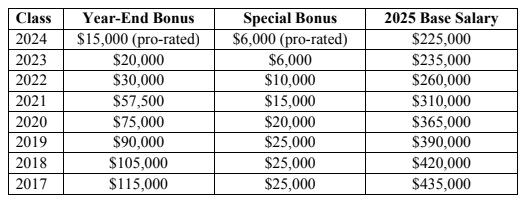Many
people
keep
an
eye
on
Above
the
Law
during
the
end
of
the
year
to
see
what
types
of
bonuses
top
law
firms
are
awarding
associates.
Although
many
top
law
firm
award
bonuses
based
on
the
class
year
of
an
associate,
a
number
of
law
firms
distribute
bonuses
based
on
other
factors,
including
the
hours
an
associate
billed
during
the
preceding
year.
Under
such
systems,
associates
usually
pull
long
hours
to
ensure
they
meet
a
given
bonus
threshold
and
earn
a
higher
bonus.
In
many
instances,
it
is
usually
best
if
law
firms
award
associates
a
higher
bonus
even
if
they
just
miss
a
higher
bonus
threshold
since
this
can
boost
morale
and
generate
goodwill
between
associates
and
an
employer.
I
once
worked
for
an
employer
that
offered
output-based
bonuses.
I
really
wanted
to
earn
a
bonus
that
was
based
on
a
given
level
of
output,
and
I
spent
many
long
days
working
hard
at
increasing
my
output
so
that
I
earned
that
particular
bonus.
By
the
end
of
the
bonus
season,
my
rough
calculations
showed
that
I
had
just
made
the
bonus
threshold,
which
was
a
relief,
and
I
looked
forward
to
being
paid
the
higher
bonus.
To
my
surprise,
when
the
official
report
came
back
evaluating
my
work,
it
turned
out
that
I
just
missed
the
bonus
threshold.
This
was
because
some
of
the
work
I
performed
was
not
being
counted
toward
bonus
calculations.
This
was
upsetting
since
the
difference
in
bonus
thresholds
was
massive,
and
I
had
worked
so
hard
trying
to
meet
the
threshold.
In
some
correspondence
to
my
superior,
I
gently
mentioned
that
I
slightly
missed
the
higher
bonus
threshold,
and
that
I
worked
hard
in
order
to
meet
that
given
threshold.
I
also
mentioned
that
I
thought
I
had
satisfied
the
threshold
but
due
to
the
way
that
the
bonuses
were
calculated,
some
of
my
work
would
not
count
toward
determining
if
I
was
owed
a
higher
bonus.
I
did
not
think
my
employer
would
take
any
of
this
into
consideration
when
awarding
my
bonus,
but
I
figured
it
didn’t
hurt
to
try.
Although
the
employer
was
clear
that
bonuses
were
determined
based
on
a
clear
mathematical
formula,
perhaps
it
was
possible
that
extenuating
circumstances
could
impact
the
bonus
determination.
To
my
surprise,
my
employer
decided
to
bump
me
up
to
the
next
bonus
amount
even
though
I
had
just
missed
the
threshold.
The
employer
acknowledged
that
I
was
very
close
to
meeting
the
threshold
and
related
that
some
of
the
calculations
used
when
determining
if
work
counted
toward
the
bonus
were
confusing.
This
was
a
big
deal
for
me,
since
the
differences
between
the
bonus
I
was
entitled
to
based
on
the
lower
threshold
and
the
bonus
I
received
was
massive
and
definitely
impacted
my
bottom
line.
Basing
bonuses
on
clear
mathematical
guidelines
makes
a
lot
of
sense.
This
prevents
people
from
receiving
disparate
bonuses
based
on
how
much
partners
like
an
associate
and
eliminates
ambiguity
about
how
bonuses
are
calculated.
Clear
bonus
thresholds
also
give
associates
an
incentive
to
work
hard
and
increase
output,
which
typically
benefits
the
law
firms
that
employ
them.
However,
law
firms
that
employ
clear-cut
bonus
criteria
should
still
be
flexible
and
award
higher
bonuses
in
situations
such
as
when
an
associate
just
misses
a
threshold
for
a
variety
of
reasons.
The
extra
bonus
amount
will
likely
have
a
small
impact
on
a
law
firm,
but
can
increase
the
morale
of
an
associate
and
tighten
the
connection
an
associate
has
with
an
employer.
 Jordan
Jordan
Rothman
is
a
partner
of
The
Rothman
Law
Firm,
a
full-service
New
York
and
New
Jersey
law
firm.
He
is
also
the
founder
of
Student
Debt
Diaries,
a
website
discussing
how
he
paid
off
his
student
loans.
You
can
reach
Jordan
through
email
at
[email protected].


















 Kathryn
Kathryn
